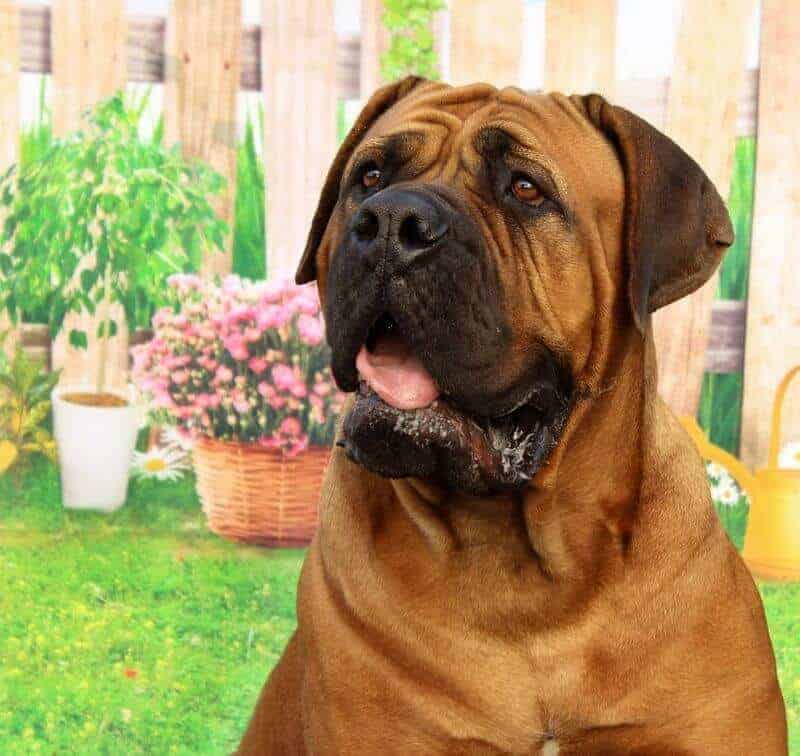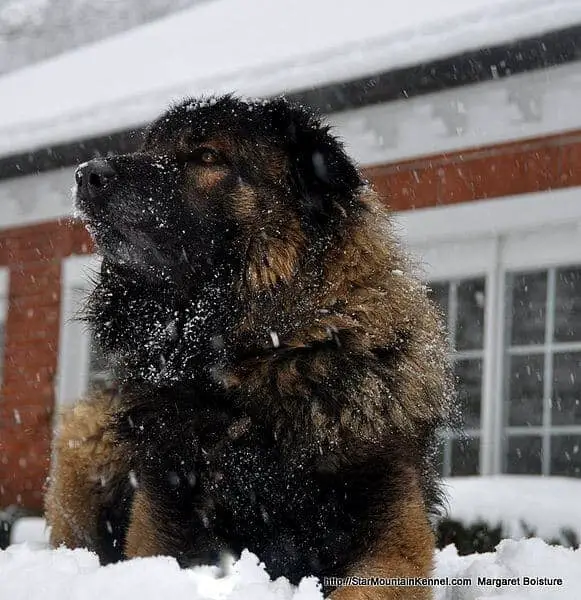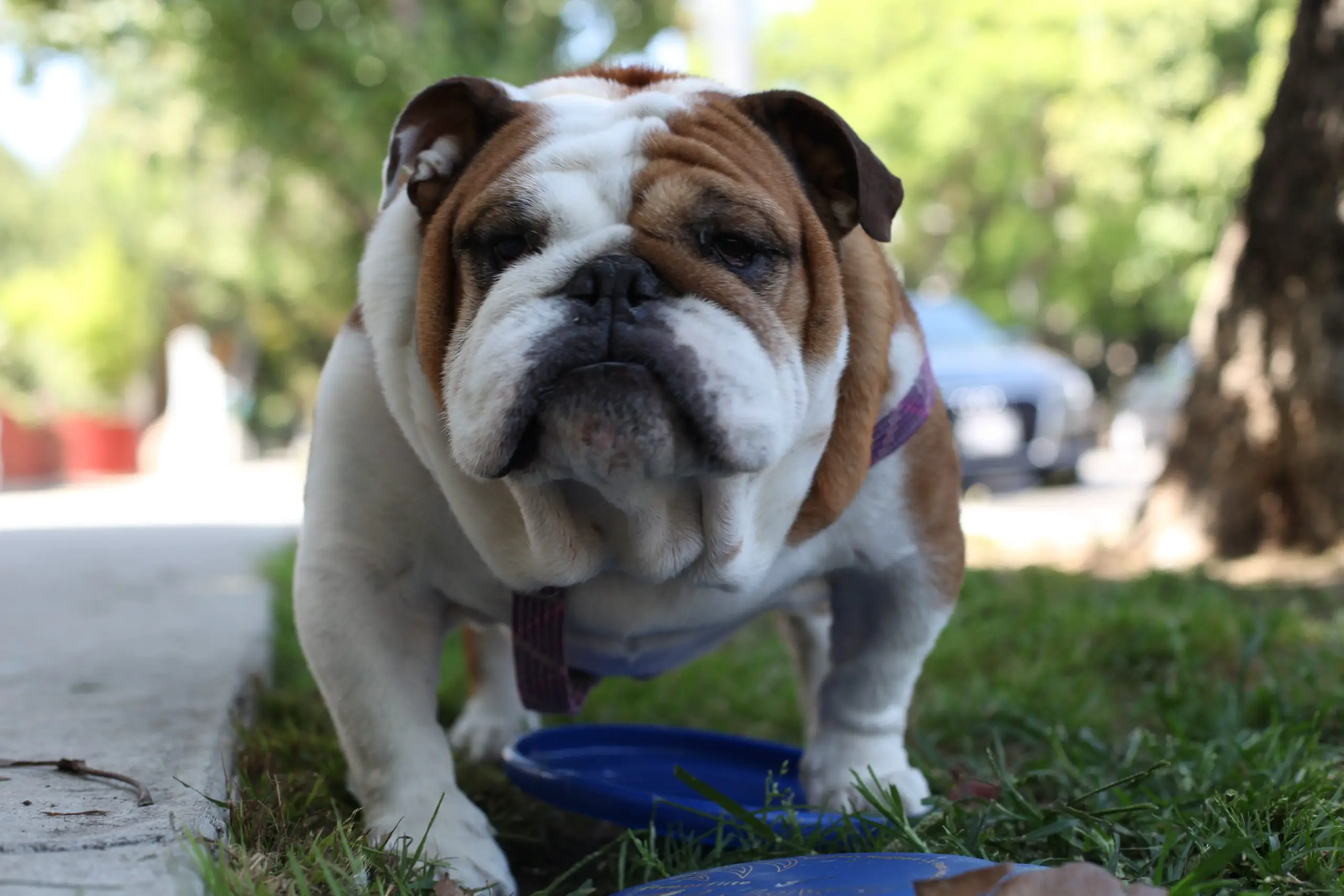The Boerboel is a large, Mastiff-type dog breed, with a distinctly square head, strong bone structure, and well-defined musculature. They are an imposing canine able to be both a formidable guard dog, as well as a loyal and loving family pet. Males are distinctly larger in stature and weight than females and this sexual dimorphism is clearly evident in the features.
They are noted to be the most agile of all Mastiff-type breeds with balanced and effortless movement which is also focused and commanding. This breed is obedient and intelligent, with incredibly strong territorial instincts. Originally bred to protect South African families from dangerous wildlife, there is no doubt that the courage and protective character of the Boerboel is still innate. This breed is confident and fearless though also, calm and unwavering in composure. These inherent opposing characteristics mean that this breed is not ideally suited to novice dog owners.
Boerboels are fun-loving, intelligent, loyal, and protective of their owners and families. As such, they are an excellent family-friendly breed for an experienced dog owner willing to put in the time required for training and exercise.
The short, dense coat of a Boerboel comes in off-white, pale tawny, reddish-brown, brown, and various shades of brindle. White patches of more than 30% and being tri-colored are considered faults. Fleshy V-shaped ears frame the blocky face; thick and loose skin produce moderate wrinkles, particularly in the forehead area which showcase their character. They often have a black mask and can have slobbery jowls that are equally repulsive and endearing. Whilst tail docking was once the norm for this breed, due to popular demand, this practice is, thankfully, no longer standard.

Boerboel Key Information
Height: 24-27 inches (male) and 22-25 inches (female)
Weight: 110-200+ pounds
Life span: 9-11 years
Breed family: Working Group
Exercise requirements: Medium
Good with children: Yes
Area of origin: South Africa
Also Known As: South African Mastiff, South African Boerboel, Bole
History
The name Boerboel (pronounced buor-bul) translates in Afrikaans simply to ‘farmers dog’. There is contestation as to the exact origins and lineage of the breed; however, there is no doubt that Boerboels were bred to be formidable working dogs capable of guarding both farm and family to the death by fending off predators such as lions, baboons, and hyenas. Imagine having a pet that is capable of fighting off a lion to save you and your child!
Considering the harsh conditions in South Africa, selective breeding was likely originally done for strength, courage, intelligence, temperament and size rather than specific physical qualities. The traits of the present-day Boerboel were only first recorded in 1983 and the American Kennel Club first recognized this working breed in 2015.
Personality
Interaction with Children
Though the Boerboel is large and intimidating in appearance, they are an intelligent breed, exceptionally loyal and generally excellent with children of all ages. Due to their substantial size, and playful nature, small children will need to be watched to avoid any accidental knocks but this is usually due to an abundance of affection as they are in fact a very tolerant breed.
A highly perceptive and devoted dog, the Boerboel is known for being sensitive to its owners’ moods and responding accordingly. Strangers should be introduced with the owners on hand to show their approval as Boerboels can be overprotective and would defend their family at all costs; this trait should be considered when having childhood friends over where play fighting may be the norm as it can be seen as an act of aggression.
Interaction with other pets
This breed has strong territorial instincts though are generally fine with other pets within the home that they have been raised with and do not see as a threat. It is not unusual for this breed to show aggression to other dogs (particularly of the same breed and sex) and to strangers, especially if it is perceived that the family or home need defending.
Feeding
Considering their size and energy level, it is no surprise that a Boerboel requires a significant amount of high-quality dog food. A Boerboel’s diet should be designed for a large or giant breed. Generally, this breed is fed twice per day (morning and evening) and the amount should be adjusted based on their size, age and activity level. The dietary needs should be kept in check throughout their lifetime as the breed does tend to put on weight as they age and become less active.
Fresh, clean water should always be available for your pet both inside and outside the home.
Food Allergies
Food allergies are rare though allergies have been noted to wheat and beef products.
Care
Like all animals, Boerboels should be routinely taken for veterinary checks to identify any health problems at an early age and at regular intervals throughout their lifetimes. Please speak to your veterinarian for a schedule that suits your pet’s needs.
Boerboels are easy to groom and have very few health problems as they were originally bred for strength and endurance. They do require a moderate-to-high level of exercise and thrive on owner companionship and affection. A daily walk is encouraged, as is an extended game of fetch. Don’t be concerned that the powerful jaws of this breed means that a ball would be popped right away – they will happily play with it flat as long as it pleases their owner.
Check their coats and ears regularly for fleas and ticks. Clean their ears from debris and brush their teeth at least weekly or take to the vet for a thorough cleaning.
Grooming
A Boerboel’s short coat sheds an average to below-average amount and does not require much care. A weekly vigorous brush with a rubber grooming mitt is ideal; your pet with love the added attention as will your vacuum. Like many short-haired breeds, Boerboels tend to shed more in warm weather so you may need to increase brushing to twice weekly during this time, much to the enjoyment of your furry friend. A monthly bath is recommended to get rid of dirt and grime but any more than this can strip the coat of essential oils and lead to skin issues.
Nails
The nails of a Boerboel should be trimmed regularly every two weeks or at least monthly. It is recommended to keep nail trimming to this schedule so that your dog is used to the procedure and it becomes routine rather than a cumbersome chore. In addition, long nails can split and cause your dog pain when walking and then lead to further behavioural problems when you want to cut them. A rough rule to remember is that if you can hear your dog tap dancing on your tile floor, then it’s time for a trim!
Exercise
Boerboels require a moderate-to-high level of exercise, both mentally and physically. Though the breed is not prone to wander, they are very territorial and will defend their property so a well-secured yard is highly advised.
Daily interaction and exercise are needed for a Boerboel as they have been bred for physical exercise, endurance and stamina. Ensure that walks are always taken on a lead as this breed is not the best at socialization and will be incredibly protective of its owner if it perceives any danger whatsoever. It is possible to exercise a Boerboel in a large yard without going for daily walks but this will still require the owner’s involvement and dedication. The breed loves to chase after feed toys, thrown bits of kibble and balls, or whatever they perceive is pleasing their owner.
Remember that the blocky head of a Boerboel is one of its defining characteristics. Often their neck is near the same circumference as their head and as such, a collar and leash can easily slip off if the dog has any tendency to pull or tug. It is best to get your dog used to a harness early on, with a dual front and back clip for easier handling since your Boerboel can easily weigh as much as a grown man!
Boerboels are a strong breed, with a lot of muscular power, and though they want to stay close to their owners, it takes a firm hand to hold them back if they run. Their nature of always wanting to please their owner may result in bouts of jealousy if other dogs are about.
Training
A Boerboel requires the commitment of a significant amount of time and energy devoted to consistent training and socialization, before becoming a dominant adult. They should be taught appropriate boundaries as they tend to want to be dominant which should never be allowed. Do not be fooled by the placid and playful nature of a Boerboel puppy as they grow quickly into a very large and powerful adult dogs.
This breed thrives on human companionship and structure. Positive reward-based reinforcement training techniques should result in an obedient and manageable dog. Harsh treatment can result in aggressive and uncontrollable behaviour which should not be tolerated. Boerboels are not prone to barking so it is best to take note quickly when they do. Boerboels are best suited to an assertive owner that is confident and not fearful of their size and strength. They are an excellent breed for further obedience and agility training and dog sports.
Housing
Although Boerboels are not prone to wander, this breed is best kept in a home with a high, secure fence and permanently locked gates. This breed loves outdoor time with their owner and is ideally suited to farms, homesteads, and large properties. Before considering a Boerboel as a pet, you should reflect on the amount of time that you have to invest in training your new dog and being involved with their daily life. Boerboels adore their owners, and their devotion to their family knows no end; however, they do require a high degree of human interaction and as such may not be appropriate for a single person.
Apartments
Boerboels are not suitable for apartments as they require not only a lot of exercise but also mental stimulation. They can get easily bored and anxious, which leads to chewing, barking, and destructive behavior.
Dog Houses / Kennels
Boerboels love being outside and, depending on the climate, can sleep outdoors if a covered area, with appropriate bedding, is provided. If you’re interested in finding suitable bedding then you can look at the top dog beds for mastiffs. Saying that they are a loving breed and would prefer to always be close to their owners. Their favorite place is likely right at your feet while you watch TV, or patiently waiting for you to get out of the shower.
Leaving them alone
It should be reiterated that Boerboels are very territorial and will not allow strangers to enter the property. This breed aims to please its owner and will become anxious if left alone for long periods of time or if the owner tends to travel. A large yard, with plenty of toys for mental stimulation, is an asset.
Health
Like many large breeds, Boerboels grow quickly and thus their muscular development may take some time to catch up. It is not recommended to exercise them too vigorously in the first six months; their playful nature will likely be enough to keep them entertained. Though considered a generally healthy breed, there are a few health considerations with regards to owning a Boerboel. Hip or elbow dysplasia, eyelid conditions,
vaginal hyperplasia, heart disease and bloat can occur. Juvenile epilepsy is not common though has been recorded recently in this breed. Please consult your vet immediately if you notice any of these conditions.
Older age
Older Boerboels tend to be lazy and may require a bit of persuasion to get outdoors and to get exercise. As a loyal pet, this breed will tend to do
whatever is asked by its owner so this does not generally take much encouragement. Boerboels often gain weight as they get older and their metabolism slows, so monitoring of their diet and exercise is encouraged. Bad breath, difficulty getting around, lumps, incontinence, and cloudy eyes can be signs of aging in many dog breeds. Please speak to your veterinarian about options for alleviating any discomfort.
Allergies
Allergies are quite uncommon in Boerboels but can result from food allergies, mites or pollen. Symptoms can include itching, bald spots, and digestion problems such as diarrhoea or vomiting. Please consult your veterinarian should your dog experience any of these symptoms.
Wrapping up
Boerboels are, without a doubt, a lot of dog to handle, both in size and personality, and should only be considered for experienced dog owners who have the time and inclination for consistent, positive training. It should never be forgotten that Boerboels were bred to protect their property and their loved ones and this instinct will remain throughout the dog’s lifetime. Saying that this breed is an excellent, kid-friendly, family companion for the knowledgeable owner.
We have tried to ensure that the information on this page is as accurate as possible. If you see any mistakes please let us know through our About Us page.







